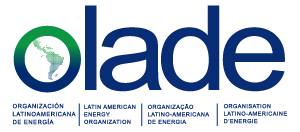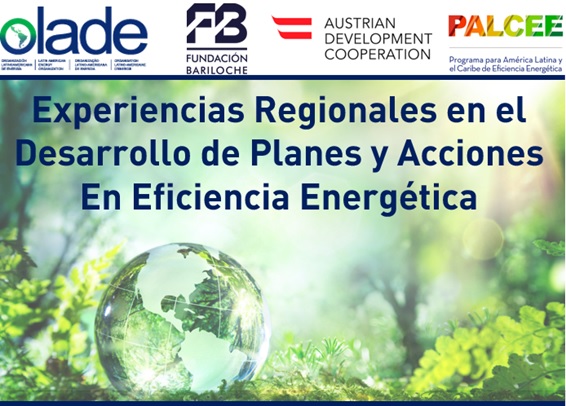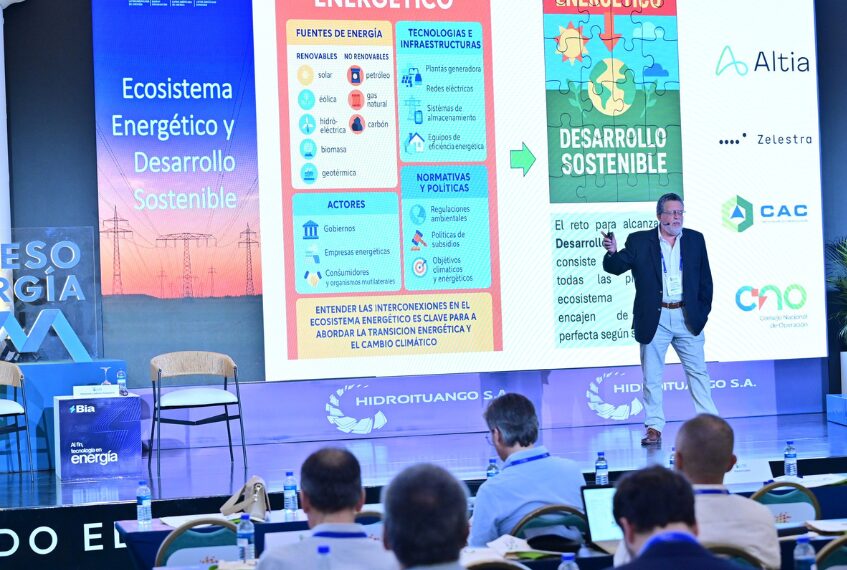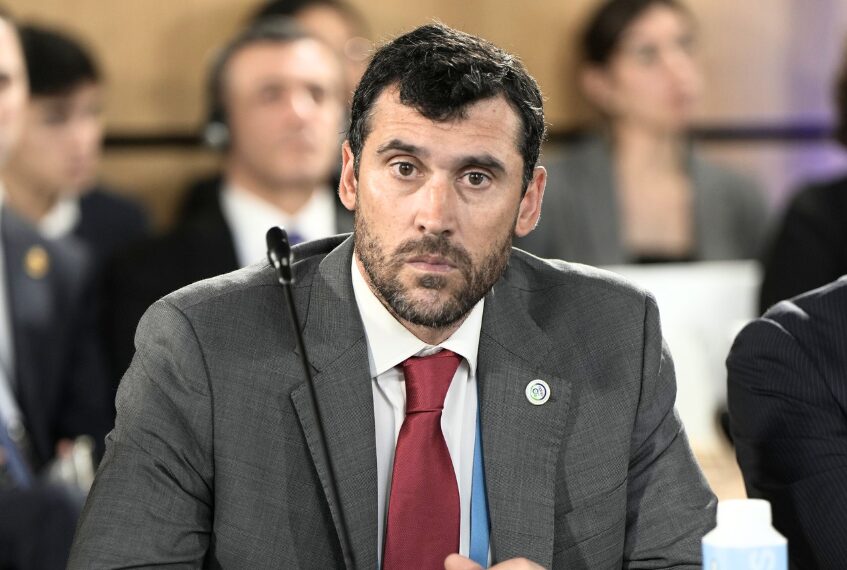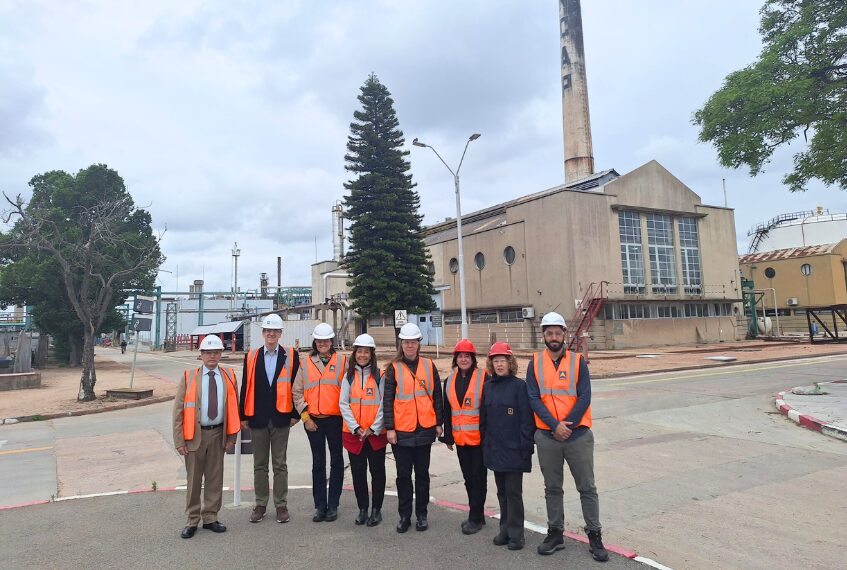As part of a joint coordination between the Latin American Energy Organization (Olade) and Fundación Bariloche, with the aim of promoting the importance of energy efficiency in the region, the virtual event “Regional Experiences in the Development of Plans and Actions in Energy efficiency” was held.
This dialogue, held on Tuesday, September 15 , 2020, was made up of a prominent panel in which participated the Executive Secretary of Olade, Alfonso Blanco Bonilla; the Director of Environment and Development of Fundación Bariloche, Daniel H. Bouille; the Minister of Energy and Non-Renewable Natural Resources of Ecuador, René Ortiz; the National Director of Electricity Generation (Argentina), Guillermo Martin Martínez; the Manager of the National Energy Efficiency Program of ELETROBRAS (Brazil), Marcel Da Costa Siqueira; the Director of Energy Efficiency Policies and Programs (Mexico), Juan Ignacio Navarrete; and the Operational Coordinator of the Uruguayan Energy Savings and Efficiency Trust, Jorge Peña.
The Executive Secretary of Olade, Alfonso Blanco, in his speech on the role and importance of energy efficiency plans in planning, referred to the Organization’s agenda on strengthening public policies and energy efficiency.
He mentioned that Olade’s objective, in this regard, is to work with everything related to sustainable energy, from renewable energies, energy efficiency, as a policy component and planning at the sectoral level, aimed at decarbonizing economies. He highlighted that in this objective, the agenda is shared with Fundación Bariloche to contribute to the region in strengthening regional capacities for the development of a market for energy efficient goods and services.
For the Executive Secretary “energy efficiency is a cross-cutting action which involves all sectors of the economy and also results from actions aimed at cultural change”. He also mentioned that energy efficiency involves the establishment of long-term policies and that it transcends the times of the political system.
In this context, the Secretary mentioned that the region progressively advanced in the development of energy efficiency policies “but there is no ecosystem that allows the development of energy efficiency and markets associated with energy efficiency.”
“ Few countries in the region have a conducive environment for the development of business models, linked to energy efficiency and that translates directly into a benefit for the economy as a whole,” he said.
At the end of his speech, the Executive Secretary of Olade emphasized the link with the Fundación Bariloche. “Together we are much more and in some way we have to deepen efforts and generate synergies between the different organizations that are linked to the energy sector to provide a value and transforming proposition of the energy sector”.
For his part, for the Director of Environment and Development of Fundación Bariloche, Daniel H. Bouille, the important thing is to implement energy efficiency policies and to achieve this he said that government institutions are required, he emphasized that energy efficiency should be considered as another energy source.
“Energy efficiency requires broad interjurisdictional cooperation with the provinces and states of our countries. We believe that a legal and regulatory framework that is in line with the political needs of the countries is essential”, said Daniel H. Bouille.
He also affirmed that energy efficiency is a cross-cutting issue and is a strong contribution to the change in the structure of the energy matrix, an aspect in which he stressed the importance of implementing actions and policies that require a comprehensive vision and a governmental institutionality.
Argentina
During his participation Guillermo Martin Martínez, National Director of Electricity Generation of Argentina, presented the challenges and initiatives that are being taken regarding energy efficiency in his country. Among the outstanding projects, he mentioned the energy efficiency project that has funding from the European Union, which consists of promoting energy efficiency measures, in particular, in the residential, productive and transport sectors.
Regarding the process of how they have obtained statistical information, he explained that the main tool they have used is to conduct surveys through the National Institute of Statistics and Census, where it was defined how energy is used in the residential sector and detect the main artifacts that are used in homes. This sample represented more than 12 million households.
In the transport sector, specific measures have been implemented on how to reduce the fuel consumption associated with the operation.
At the moment the Energy Secretariat and the Ministry of Productive Development are defining a national program for the renovation of electrical appliances.
Other important actions that are being implemented in Argentina are the National Housing Labeling Program that defines a participation scheme for the 3 levels of government; nation, province and municipality.
Program that consists of the definition of a label that will be part of the characteristics of the home, which allows providing information on all the homes that are located in the different bioclimatic regions of the country so that they all have a common evaluation methodology in terms of its energy performance.
Brazil
Marcel Da Costa Siqueira, Manager of the National Energy Efficiency Program of ELETROBRAS, shared information on the execution of the National Program for the Conservation of Electric Energy, which is coordinated by the Ministry of Mines and Energy, through which, in the last 5 years , more than 20 million MW/h of energy were saved.
Among the main energy efficiency policies in force in Brazil, he mentioned the Labeling Program that has existed since 1984 and a program in the area of fuels executed by PETROBRAS, among others. Brazil has an Energy Efficiency Law in which it establishes all the minimum standards for equipment.
Additionally, Marcel Da Costa Siqueira reported that his country has a 10-year Energy Efficiency Plan, which has a short and medium-term horizon.
In addition, he maintained that a new Energy Efficiency Plan is currently in Public Consultation that runs until 2050. On the other hand, he announced that there is an Energy Expansion Plan that has a horizon of 10 years and is executed with the support of ELECTROBRAS, the Energy Research Company (EPE) and the institutional coordination of the Ministry of Mines and Energy.
In this regard, he stated that this work aims to develop policies to reduce electricity consumption in the main Brazilian socioeconomic sectors and to detail a set of structural impact actions to allow the achievement of energy efficiency gains for Brazil, in the medium term, based on the 10-year Plan, considering the advances in digitization in the productive sectors.
Ecuador
The Minister of Energy and Non-Renewable Natural Resources of Ecuador, René Ortiz, in his speech stated that “Ecuador has been a dollarized economy since 2000 and has three economic axes: exports, foreign investment and public debt.“
Regarding energy, he highlighted that Ecuador is a net exporter of energy. “We export to Colombia and Peru, this puts us in the energy integration scheme,” he said.
Regarding the energy demand by sector, he specified that in the transport sector the country has 48.8% and the industry 14.5%. And that the objective in the transport sector is to optimize the consumption of energy for cargo and passengers, through the execution of energy efficiency projects that generate benefits in the sector.
Regarding the National Energy Efficiency Plan, it was reported that the following lines of action are contemplated: industrial, transportation, residential, commercial and public services, consumption of the energy sector and the Galapagos Islands.
In the industrial axis, he indicated that they are working on adopting the ISO 5000 standard, encouraging cogeneration programs in the industry and replacement programs for motors, pumps, boilers and heaters.
The Minister of Energy René Ortiz, also announced that in the country there is 97% coverage by the electricity sector, which mostly is hydroelectric generation.
Mexico
Mexico’s participation was represented by Juan Ignacio Navarrete, Director of Energy Efficiency Policies and Programs of the National Commission for the Efficient Use of Energy, who began his presentation by explaining that his country has 40 years of experience implementing energy efficiency actions.
As a review, he explained that the Federal Electricity Commission (CFE), which is the State Energy Company, began to carry out the first programs in the 1980s, which emerged from the Democratic Planning System.
In the mid-90s, the first public policy programs emerged, particularly the official Mexican energy efficiency standards to regulate the consumption standards of the main equipment that were in force at that time. Currently this program continues and is innovated every year.
Later in 2008, the Sustainable Energy Use Law came into force, which defines an energy efficiency program throughout its value chain, covering topics from resource exploration, generation, distribution and final consumption such as an ordering.
In addition, he explained that “the energy efficiency policy is a transversal policy that was not only being part of the planning of the energy sector, but also addresses other sectors of planning.”
The most recent institutional framework already dates back to the 2013 energy reform processes, which concluded in 2015 with the Energy Transition Law. This Law, which has two components, on the one hand, clean energy and, on the other, energy efficiency, has the objective of using sustainable energy in terms of clean energy and is focused on the electricity industry.
The main actors promoting energy efficiency in Mexico are the Secretariat of Energy, which leads national policy, and the National Commission for the Efficient Use of Energy.
Juan Ignacio Navarrete, commented that in fragments of the Energy Transition Law it states that the Federal Government, in its mandate, must update the transition strategy twice. From 2014 to the present, 3 versions have been formulated (2014-2016-2020). This strategy becomes the ultimate plan for the clean energy and energy efficiency part.
This strategy must integrate components of medium and short term policies and prospective analysis.
Uruguay
Jorge Peña, Operational Coordinator of the Uruguayan Energy Savings and Efficiency Trust of the National Energy Directorate of the Ministry of Industry, Energy and Mining, spoke about the energy policy that began to be laid out in the country in 2008 and was finally approved in 2010.
This energy policy is made up of 4 axes: the institutional one, where the role of the State in the different energy policies is reinforced; that of supply, which focuses on the diversification of the matrix with the promotion of renewable energies; the demand one that focuses on energy efficiency, and the social axis in which energy access is emphasized. In Uruguay, access to the electricity grid exceeds 99%.
Jorge Peña mentioned that in the case of Uruguay in 2005 the term energy efficiency was not known, but there were 2 countries with great progress on these issues which arose from the crisis.“In Uruguay a lot was learned from the Mexican and Brazilian experience.”
Likewise, he pointed out that in Uruguay what could be generated through energy efficiency was not dimensioned and there were no energy service companies. Subsequently, there were already more than 50 registered companies and a market, knowledge and dynamics had been generated that ended up being completely unexpected.
Communication Department
and Institutional Relations
gabriela.jarrin@olade.org
